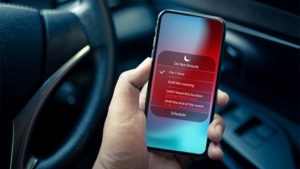
Distracted driving has become an escalating and deadly problem. The National Highway Traffic Safety Administration recorded 2,841 distracted driving-related deaths on our nation’s roads in 2018 – 7.8% of all crash fatalities that year.
While the number was down from 2017, we have a long way to go considering this is an avoidable risk. NHTSA reminds everyone that texting while driving and otherwise driving distracted – by phones, passengers, eating, drinking or even tuning the radio – are dangerous, and often illegal, habits.
Local law enforcement agencies and NHTSA are working to spread the word about the dangers of distracted driving. Law enforcement officers typically step up enforcement efforts and issue citations for distracted-driving violations during the annual Distracted Driving Awareness campaign, which in 2020 was moved from April to October. The campaign aims to remind drivers of the consequences of their reckless actions.
According to NHTSA, between 2012 and 2018, nearly 23,000 people died in crashes involving a distracted driver. That’s 23,000 people who didn’t make it home.
While distracted driving can take many forms – using GPS, applying makeup, interacting with other passengers, sipping hot coffee – the most dangerous behavior is texting and driving. The bottom line is this: If your attention is anywhere other than on the road, you’re distracted.
Young drivers are some of the most common offenders, according to NHTSA. In 2018, 8% of people killed in crashes involved teens 15-19, who died when teen drivers were distracted at the time of the crash.
If you don’t want to get a ticket for distracted driving, it’s easy. Focus on the road and not on your phone. If you need to text, stop and pull over. Do not drive.
Whether you’re an adult or teen driver, follow these safe driving tips:
- If you struggle with the urge to check your phone or to text while you drive, activate your phone’s “Do Not Disturb” feature or place your phone out of reach by putting it in the trunk, glove box, or back seat to keep you from mindlessly grabbing it.
- Ask a passenger to be your “designated texter.” Give them access to your phone to respond to calls or messages.
- Do not engage in social media scrolling or messaging while driving. Those notifications will be waiting for you when you arrive at your destination. No text or comment is worth dying for.
For more information, visit the NHTSA’s distracted driving page
This loss control information is advisory only. The author assumes no responsibility for management or control of loss control activities. Not all exposures are identified in this article.
Article by our insurance partner: Cincinnati Personal Lines